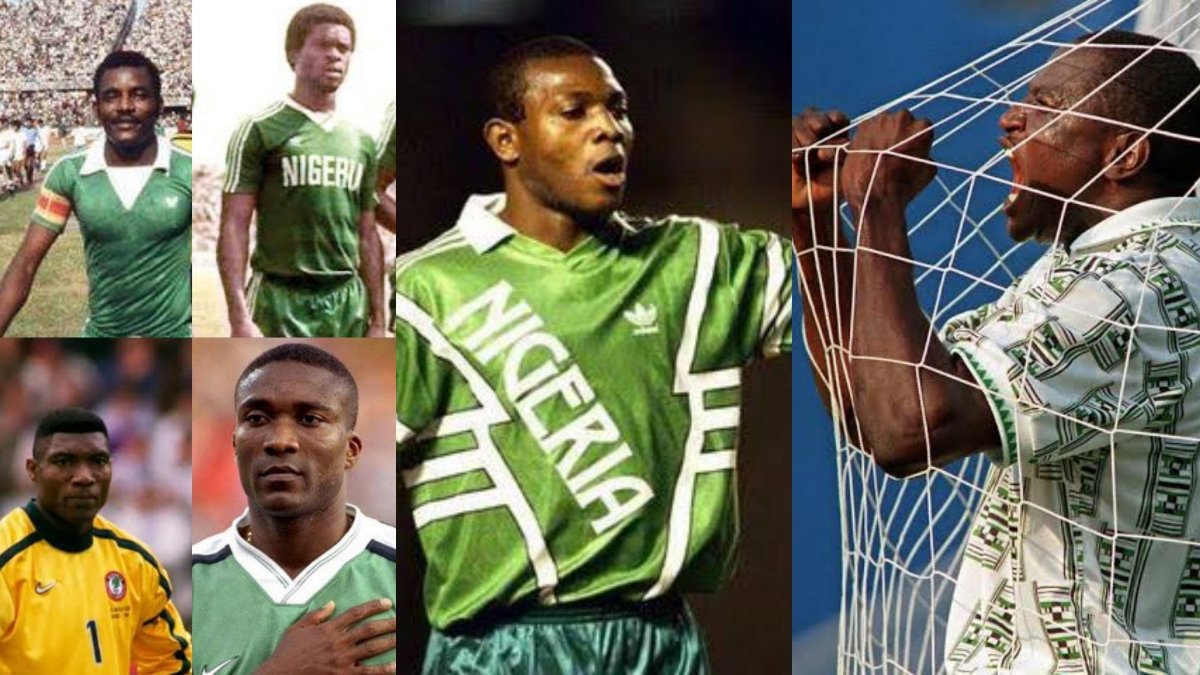The Super Eagles of Nigeria produced some of Africa’s most iconic footballers. Their talents lit up national and international stages. From Christian Chukwu’s disciplined leadership to Jay-Jay Okocha’s dazzling skills, these legends carved lasting marks on the sport.
Six Super Eagles legends; Rashidi Yekini, Uche Okafor, Stephen Keshi, Samuel Okwaraji, Peter Rufai and Christian Chukwu, etched unforgettable marks on Nigerian football. Their stories show how national team triumphs contrasted with club careers, highlight the recognition they earned, and celebrate the legacies they built.
Heroes in Green, Journeymen Abroad: The Double Life of Nigeria’s Football Icons:
Nigeria’s football legends lit up the world in Super Eagles green, winning continental glory and global respect. Yet many struggled abroad, enduring modest or inconsistent club careers that exposed the gulf between national triumph and professional hardship.
Rashidi Yekini (1963-2012)
Rashidi Yekini, born on 23 October 1963 in Kaduna, rose from a humble life as a welder and mechanic to become Nigeria’s most celebrated striker. He launched his career at Shooting Stars, moved to Ivory Coast’s Africa Sports, and reached his peak in Portugal with Vitória Setúbal (1990-1994). There, he scored 91 goals in 114 matches. In the 1993-94 season, he topped the Primeira Liga scoring chart and became the first Nigerian to win the African Footballer of the Year award.
For Nigeria, Yekini defined 1990s football. He scored 37 goals in 62 matches, a national record that still stands. His most iconic moment came at the 1994 FIFA World Cup in the United States, when he netted Nigeria’s first-ever World Cup goal against Bulgaria. His celebration; grabbing the net and weeping with joy, remains one of the tournament’s most unforgettable images. That same year, he led the Super Eagles to AFCON glory in Tunisia, winning both the top scorer and best player awards.
Behind the glory, Yekini faced struggles. His European career earned recognition, but his compensation at home remained meagre. Like many teammates, he received little welfare support. After retirement, he battled financial decline and mental health issues while living in Ibadan.
On 4 May 2012, Yekini died at age 48 under controversial circumstances after relatives took him from his home. Official reports blamed mental health complications, but doubts linger. Friends and neighbours recalled his withdrawal from society, and much of his wealth seemed to just disappear.
Uche Okafor (1967-2011)
Uchechukwu “Uche” Okafor, born on 8 August 1967 in Owerri, Imo State, stood out as a calm, commanding central defender who anchored Nigeria’s golden generation. He displayed quiet leadership and composure under pressure, earning trust at the back even if he rarely grabbed headlines.
Okafor built his career in Belgium, France, and Germany, but he shone most in the United States with Kansas City Wizards (now Sporting Kansas City). From 1996, he played over 100 matches and helped the club win the MLS Cup in 2000. His consistency earned him respect as one of the league’s most reliable defenders.
For Nigeria, Okafor earned 34 caps between the late 1980s and 1990s. He played a vital role in the 1994 AFCON-winning squad in Tunisia and featured in Nigeria’s first-ever World Cup the same year, when the Super Eagles reached the Round of 16. He also represented Nigeria at the 1998 World Cup in France, providing stability as younger defenders joined the squad.
Though he never attracted the fame of stars like Rashidi Yekini or Jay-Jay Okocha, Okafor’s consistency made him indispensable. Financially, he often fared better at club level, especially during his MLS years, as Nigeria’s national team compensation remained inconsistent. After retiring, he settled in the United States, where he coached, mentored young players, and stayed active in the Nigerian community.
Tragedy struck on 6 January 2011, when Okafor was found dead in his Texas home at age 43. Authorities initially reported suicide, but controversy soon followed. His family in Nigeria rejected that claim, insisting he was not the type to take his own life. The disputed circumstances deepened the grief surrounding his death and highlighted the struggles many African stars faced after retirement.
Stephen Keshi (1962-2016)
Stephen Keshi ranked among Nigeria’s most commanding football figures, excelling both as a player and later as a coach. His national team career spanned the early 1980s to 1994, during which he earned 60 caps and retired as Nigeria’s second-most capped player. He captained the Super Eagles to their historic 1994 Africa Cup of Nations triumph and led them at the 1994 World Cup, where Nigeria reached the Round of 16. As a strong, authoritative defender, Keshi anchored the squad and inspired the nation’s celebrated “Golden Generation.”
Keshi also built a respectable club career. He began at New Nigeria Bank, moved to Stade d’Abidjan and Africa Sports in Ivory Coast, then established himself in Belgium. At Lokeren and later Anderlecht, he thrived, winning the Belgian league in 1991. He later played for Strasbourg in France and other clubs. Although he enjoyed success in Europe, his leadership with Nigeria; and later his coaching triumphs, cemented his legacy more deeply.
After retirement, Keshi transitioned into coaching and wrote another historic chapter. He managed Nigeria and Togo, and in 2013 he guided the Super Eagles to an AFCON title. That achievement made him only the second person to win the competition both as a player and a coach.
Yet Keshi’s post-career years exposed the struggles Nigerian legends often face. Contract disputes with the Nigerian Football Federation overshadowed his coaching contributions. In June 2016, tragedy struck when he died of cardiac arrest, just months after losing his wife to cancer. His burial received minimal government support, once again highlighting the neglect that haunts Nigeria’s football heroes.
Samuel Okwaraji (1964-1989)
Samuel Okwaraji stands as one of the most poignant figures in Nigerian football history. His national team career, though brief, lasted from 1988 to 1989. In that short time, he earned fewer than a dozen caps but made an unforgettable impact. He scored in Nigeria’s emphatic 6–0 victory over Ethiopia during the 1988 AFCON qualifiers and quickly earned a reputation as a tireless midfielder admired for his energy, patriotism, and commitment.
Tragedy struck on 12 August 1989, when Okwaraji collapsed and died at age 25 during a World Cup qualifier against Angola in Lagos. His sudden death turned him into a national symbol of sacrifice and devotion.
At club level, Okwaraji’s career never reached the same heights. He began in the youth ranks of AS Roma in Italy, then played for NK Dinamo Zagreb in Yugoslavia, Austria Klagenfurt, VfB Stuttgart in Germany, SSV Ulm, and K. Berchem Sport in Belgium. He spent most of his European career in lower-tier leagues, with limited first-team opportunities and no major trophies. This modest club record contrasted sharply with his passionate national team identity, where his performances and ultimate sacrifice elevated him to legendary status.
After his death, Nigeria celebrated Okwaraji with tributes and hailed him as a fallen hero. Yet institutional support for his family remained minimal. Decades later, his name still echoes as a symbol of patriotism and selflessness, while his story highlights a deeper problem; the country’s failure to properly honor and care for its football heroes beyond symbolic gestures.
Peter Rufai (1963-2025)
Peter Rufai rose as one of Nigeria’s most iconic goalkeepers. From 1981 to 1998, he earned 65 caps and carved his name into Nigerian football history. Fans fondly nicknamed him “Dodo Mayana”, and throughout much of the 1990s, he commanded the posts as Nigeria’s undisputed first-choice goalkeeper. He drove Nigeria to victory at the 1994 Africa Cup of Nations and guarded the net at both the 1994 and 1998 FIFA World Cups, helping the team reach the Round of 16. His penalty saves in the semifinals of the 1988 and 1994 AFCON tournaments thrilled fans and became unforgettable highlights.
Rufai built a wide-ranging club career, though it never matched the glory of his international exploits. He launched his journey at Stationery Stores and Femo Scorpions before crossing borders to play for Dragons de l’Ouémé in Benin. He then embarked on a European adventure with Lokeren and Beveren in Belgium, Go Ahead Eagles in the Netherlands, Farense in Portugal, and Deportivo La Coruña in Spain. Rufai displayed flashes of brilliance in Europe but often served as a backup in bigger clubs. At Farense, he finally enjoyed consistent first-team action. Despite his efforts abroad, Nigerians remembered him most as the nation’s reliable World Cup and AFCON goalkeeper, a reputation that outshone his modest club achievements.
After retirement, Rufai devoted himself to grooming young talents through goalkeeping academies in Nigeria and Spain. Yet the Nigerian Football Federation and the government offered him little or no support. Illness plagued his final years, and when he died in July 2025, his family struggled to finance his burial. News of their resort to crowdfunding ignited public outrage and exposed Nigeria’s neglect of its football icons.
Christian Chukwu (1951-2025)
Christian Chukwu stands as one of the most respected figures in Nigerian football history. In 1980, he reached the peak of his national team career when he captained Nigeria to its first-ever Africa Cup of Nations (AFCON) title. A commanding defender with sharp tactical intelligence, Chukwu earned the nickname “Chairman” because he radiated authority on the pitch. As captain, he anchored the defense and guided a youthful Nigerian squad to continental glory, cementing the nation’s rise as a football powerhouse.
At club level, Chukwu built most of his career with Enugu Rangers, one of Nigeria’s most successful domestic sides. With the Rangers, he lifted multiple league titles and secured his place as a club legend. Unlike later generations of Super Eagles stars, he saw few international opportunities. Limited mobility for African players in his era confined his brilliance to Nigeria’s domestic scene. While he dominated local football, his achievements with the national team carried his reputation beyond Nigeria’s borders.
After retiring, Chukwu stayed active in football, coaching the Super Eagles and shaping the sport’s development. Still, hardship clouded his later years. Despite his iconic status, he battled financial struggles, with reports showing that the Nigerian Football Federation (NFF) owed him ₦206 million (about $128,000) in unpaid salaries.
Chukwu passed away in 2025, revered by fans and peers but burdened by systemic failures that denied him recognition and fair compensation. His story, both glorious and tragic, reflects the triumphs and struggles of Nigerian football history.
Glory Without Reward: How Nigeria Failed Its Football Legends
Financial neglect continues to haunt Nigeria’s football legends. Many gave their best years to the Super Eagles but faced unpaid bonuses and salaries. Christian Chukwu died in 2025 still owed ₦206 million ($128,000). Stephen Keshi fought bitter contract disputes during his coaching stint. Samuel Okwaraji’s family received almost no support after his tragic on-pitch death in 1989. In 2025, Peter Rufai’s relatives raised burial funds, sparking outrage from Taribo West and Augustine Eguavoen. Rashidi Yekini also died in hardship, while the government delivered the promised housing for the victorious 1994 AFCON squad only in 2024; decades after their triumph.
Officials awarded national honors like MON titles and offered glowing tributes, but they rarely provided material support. Rufai’s death drew condolences from the NFF and President Tinubu, yet critics dismissed them as hollow. Similarly, the state offered little assistance when Keshi, who led Nigeria to the 2013 AFCON and won CAF Coach of the Year, was buried in 2016.
From Triumph to Tragedy: Why Nigeria Must Save Its Football Heroes
Legends like Okocha and Kanu continue to thrive, earning respect through enduring global recognition and post-career success. By contrast, the struggles and tragic outcomes of Yekini, Chukwu, Keshi, Okwaraji, and Rufai reveal the harsh reality of inconsistent support. To truly honor those who gave their lives and careers to the game, Nigeria must build pensions, welfare programs, and institutional roles for its football icons.







